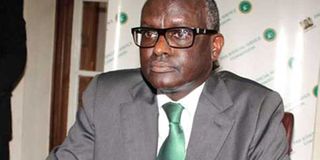High Court to decide Lenaola nomination to Supreme Court

Justice Isaac Lenaola when he appeared before a Judicial Service Commission panel at the Supreme Court on October 12, 2016 to be interviewed for the position of Supreme Court judge. PHOTO | DENNIS ONSONGO | NATION MEDIA GROUP.
What you need to know:
- The gender commission told High Court judge Joseph Onguto on Wednesday that in challenging Justice Lenaola’s recommendation to serve on the apex court, it is exercising its mandate in seeking to enforce the Constitution.
- The commission alleged that its case seeks to interrogate the meaning of adequate and equal opportunities for appointment, training and advancement at all levels of the public service of men and women in all state organs as well as government.
A High Court division headed by Justice Isaac Lenaola will decide whether he will be nominated to sit on the Supreme Court.
This follows a legal battle pitting the National Gender and Equality Commission against the Judicial Service Commission (JSC).
The gender commission has accused the JSC of failing to consider the two-thirds gender principle in the appointment of the judge.
Through lawyer Sylvester Muli, the commission told High Court judge Joseph Onguto on Wednesday that in challenging Justice Lenaola’s recommendation to serve on the apex court, it is exercising its mandate in seeking to enforce the Constitution.
CERTIFIED URGENT
Mr Muli argued that the court needed to temporarily stop Justice Lenaola from being sworn in and gazetted as a Supreme Court judge.
“The immediate cause for concern in this petition is therefore the constitutionality of JSC’s action of nominating Justice Lenaola as the seventh member of the Supreme Court yet he is a man because they have obviously failed to give an equal opportunity to women in violation of the law,” he said.
Mr Muli requested the court to issue temporary orders, but Justice Onguto directed that the case be heard next week by his senior.
Justice Lenaola himself heads the constitutional and human rights division of the High Court.
Justice Onguto only agreed to certify the matter as urgent and directed it to be heard on November 2.
The gender commission alleged that its case seeks to interrogate the meaning of adequate and equal opportunities for appointment, training and advancement at all levels of the public service of men and women in all state organs as well as government.
The commission also argued that its case questions whether the JSC’s perceived less-than-equal treatment of women through its overt practice and silent policy of limiting the number of women judges in the top court to two is discriminatory.
PUBLIC INTEREST
“It is similarly necessary in the public interest to grant an order for stay to avoid a prospect of wastage of public funds through his taking of office yet it might be a process that may be rendered unnecessary should this case succeed,” Mr Muli said.
According to gender commission chairman Winfred Lichuma, his agency had advised the JSC to consider the two-thirds gender rule when appointing a top court judge in the place of Justice Philip Tunoi, who was sent on retirement just before then Chief Justice Willy Mutunga left office.
The gender commission claimed it sent an advisory to the JSC through its Secretary Anne Amadi on July 15 advising it to consider the two-thirds gender principle in filling the positions of Chief Justice, Deputy Chief Justice and judge of the Supreme Court.





